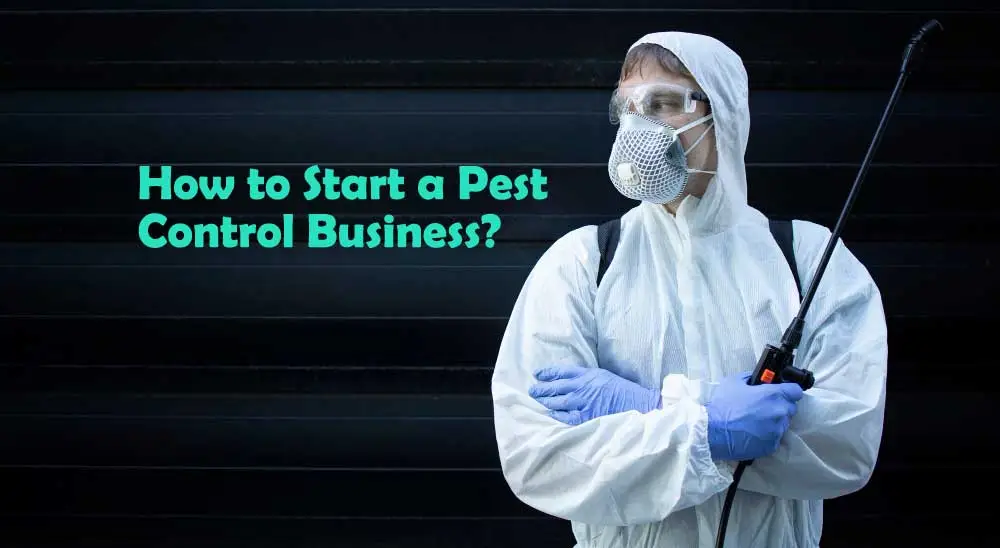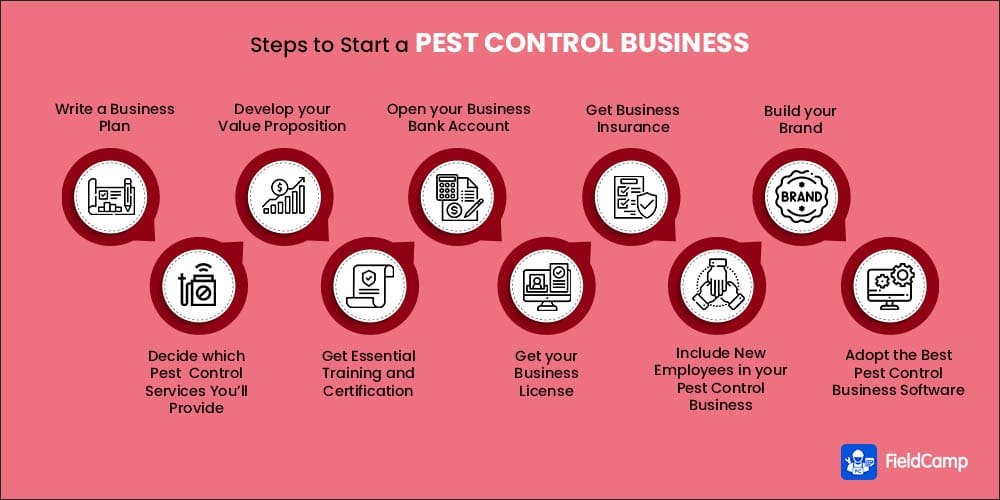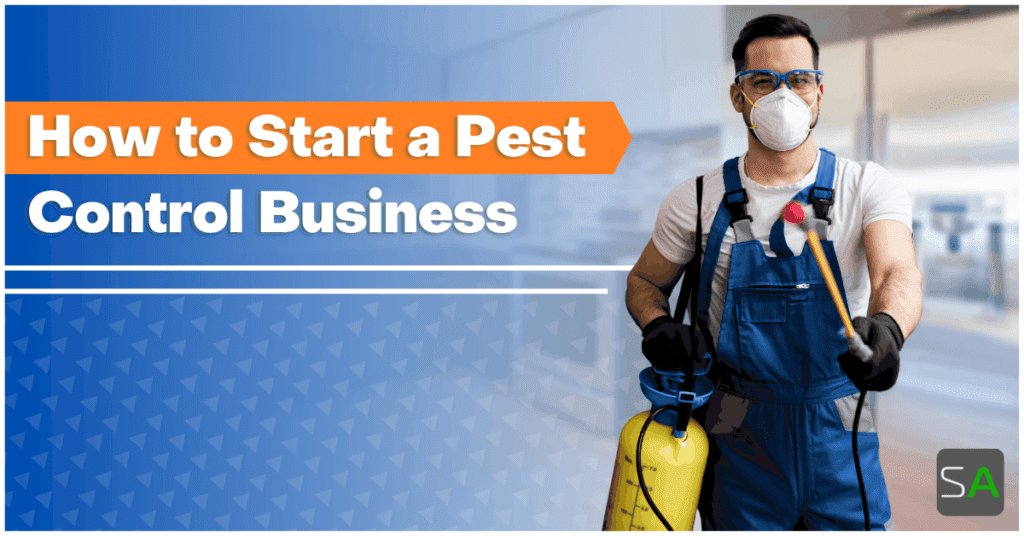If you’re passionate about helping people solve their pest problems and want to start your own business in the industry, look no further! This comprehensive guide is here to provide you with all the essential information and steps you need to take to start a successful pest control business. From obtaining the necessary permits and licenses to marketing your services and building a customer base, this guide will equip you with the knowledge and resources to kickstart your entrepreneurial journey. So, grab a cup of coffee, sit back, and get ready to embark on this exciting venture in the world of pest control!

Business Planning
Starting a pest control business requires careful planning and strategizing. The first step in the process is to identify your target market. Who are your potential customers? Are they homeowners, business owners, or both? Once you have a clear understanding of your target market, you can move on to researching your competitors. What services are they offering? How do their prices compare to yours? This information will help you position your business in the market and determine your unique selling proposition.
After conducting thorough market research, it’s time to create a business plan. This plan will outline your business goals, target market, marketing strategy, pricing structure, and financial projections. It will serve as a roadmap for your business and help you stay focused and organized as you launch and grow your venture.
Next, it’s important to define the services you will offer as a pest control business. Will you specialize in residential or commercial pest control? Will you offer general pest control services or focus on specific pests, such as rodents or insects? Understanding your services will allow you to tailor your marketing efforts and establish your expertise in the field.
Setting a pricing structure is another crucial aspect of business planning. It’s essential to strike a balance between affordability for your customers and profitability for your business. Consider factors such as the size of the property, the severity of the pest infestation, and the type of services required when determining your prices.
Licensing and Certification
Operating a pest control business requires complying with various regulations and obtaining the necessary licenses and certifications. Check your local licensing requirements to ensure you are legally allowed to offer pest control services in your area. This may involve obtaining a pest control license or registering with a local agency.
In addition to licensing, you may need to obtain permits for certain types of services or for the use of certain pesticides. Familiarize yourself with the regulations in your area to ensure you are in compliance and avoid any legal issues.
Depending on your location, you may also need to apply for state certification. Certification ensures that your business meets specific standards and demonstrates your competence in pest control. Look into the certification requirements for your state and take the necessary steps to become certified if required.
Working with chemicals and pesticides can pose risks to both your customers and your employees. It’s important to understand workers’ compensation insurance and how it applies to your business. This insurance provides coverage for employees who are injured on the job and can help protect your business from potential lawsuits.
Consulting with an attorney who specializes in pest control regulations can provide guidance and ensure you meet all legal requirements. They can help you navigate the complexities of licensing, certification, and insurance, as well as provide advice on other legal considerations, such as contracts, liability, and intellectual property.
Establishing a legal entity, such as a limited liability company (LLC) or a corporation, can offer protection for your personal assets and provide a more professional image for your business. Consult with an attorney or a business advisor to determine the best legal structure for your pest control business.

Insurance and Legal Considerations
Running a pest control business comes with inherent risks, which is why it’s crucial to have the right insurance coverage. Purchase liability insurance to protect your business from potential claims or lawsuits resulting from property damage or injuries related to your services. This insurance can cover legal fees, settlements, medical expenses, and other costs associated with such incidents.
Workers’ compensation insurance is another essential coverage to consider. It provides benefits to employees who are injured or become ill as a result of their work. By having workers’ compensation coverage, you can protect your employees and your business from financial burdens in the event of an accident or illness on the job.
Consulting with an attorney who specializes in pest control regulations can provide invaluable guidance. They can review your contracts, help you understand your rights and responsibilities, and provide advice on any legal issues that may arise.
Establishing a legal entity for your business, such as an LLC or corporation, can offer several benefits. It can help protect your personal assets in the event of a lawsuit or debt, limit your personal liability, and provide a more professional image to your customers and partners. Consult with an attorney or a business advisor to determine the best legal structure for your pest control business.
Equipment and Supplies
To effectively provide pest control services, you will need the right equipment and supplies. Start by creating an inventory list of the items you will need. This may include items such as sprayers, traps, baits, pesticides, personal protective equipment (PPE), inspection tools, and more. Having a comprehensive list will ensure you have everything you need to perform your services efficiently.
Once you have your inventory list, it’s time to purchase the necessary equipment. Research reputable suppliers and compare prices to ensure you are getting the best value for your money. Consider the quality and durability of the equipment, as well as any warranties or guarantees offered.
In addition to equipment, it’s important to stock up on supplies. This includes pesticides, baits, traps, and other consumable items that are essential for your day-to-day operations. Having an ample supply of these items will prevent delays in service and ensure you are always prepared to address your customers’ pest control needs.
Consider incorporating eco-friendly alternatives into your pest control practices. Many customers are increasingly conscious of the environment and prefer environmentally friendly solutions. Research and invest in eco-friendly pest control products and practices to attract environmentally conscious customers and differentiate your business from competitors.

Marketing and Advertising
To attract customers and grow your pest control business, effective marketing and advertising strategies are essential. Start by developing a comprehensive marketing strategy that outlines your target market, key messages, and marketing channels.
One of the most powerful marketing tools for a pest control business is a professional website. Build a website that showcases your services, expertise, and customer testimonials. Make sure it is user-friendly, visually appealing, and optimized for search engines.
Utilize social media platforms to connect with your target audience and promote your services. Create engaging and informative content that educates customers about common pest problems and provides practical solutions. Engage with your followers by responding to comments and inquiries promptly.
Invest in search engine optimization (SEO) to improve your website’s visibility in search engine results. Optimize your website’s content, meta tags, and keywords to rank higher in relevant search queries. Consider hiring an SEO expert if you’re not familiar with the technical aspects of SEO.
Implement targeted advertising campaigns to reach potential customers. This can include online ads, print ads, direct mail campaigns, and more. Consider partnering with other local businesses or industry associations for co-marketing opportunities.
Employee Recruitment and Training
As your pest control business grows, you may need to hire additional staff to meet customer demand. Start by determining your staffing needs based on the volume of work and the type of services you offer. Consider both full-time and part-time positions, depending on your requirements.
When it comes to recruiting employees, advertise your job openings through various channels, such as online job boards, local newspapers, and industry-specific forums. Clearly outline the job requirements, responsibilities, and qualifications to attract candidates who are the right fit for your business.
Screen and interview candidates to assess their skills, experience, and suitability for the role. Ask behavioral and situational questions to gauge their problem-solving abilities, customer service skills, and knowledge of pest control practices. Consider conducting background checks and contacting references to ensure the candidates’ credibility.
Providing thorough training to your employees is crucial to maintain service quality and customer satisfaction. Develop a comprehensive training program that covers both theoretical knowledge and hands-on skills. This can include classroom training, on-the-job training, and shadowing experienced technicians. Regularly evaluate your employees’ performance and provide ongoing training and support to help them improve and grow in their roles.

Offering Additional Services
To expand your pest control business and attract a larger customer base, consider offering additional services beyond basic pest control. Identify value-added services that complement your existing offerings and address common customer needs.
One potential value-added service is wildlife control. Many homeowners and businesses face issues with wildlife invading their properties. Offer humane wildlife removal and exclusion services to help customers deal with these problems effectively.
Another additional service to consider is rodent extermination. Rodents, such as mice and rats, can cause significant damage to properties and pose health risks. Offering specialized rodent control services can help customers eliminate these pests and prevent future infestations.
Consider offering preventative maintenance programs to help customers proactively address pest control issues. This can include regular inspections, pest-proofing measures, and ongoing treatments to keep pests at bay. Not only will this benefit your customers, but it can also provide a steady source of recurring revenue for your business.
Customer Relationship Management
Effective customer relationship management is crucial for the success of your pest control business. Implement customer management software to organize and track customer information, appointments, and service history. This will help you deliver personalized and efficient service to your customers.
Providing exceptional customer service is key to building strong relationships and earning customer loyalty. Train your employees to be friendly, professional, and knowledgeable. Encourage them to go the extra mile to exceed customer expectations and address any concerns or issues promptly.
Establish customer loyalty programs to reward repeat customers and encourage referrals. This can include discounts on future services, free inspections, or exclusive offers. By showing your appreciation to loyal customers, you can foster long-term relationships and generate positive word-of-mouth referrals.
Request customer feedback to gauge their satisfaction and identify areas for improvement. This can be done through customer surveys, follow-up calls, or online reviews. Use the feedback to make necessary adjustments to your services and address any issues or concerns raised by customers.

Health and Safety Protocols
Ensuring the health and safety of your employees, customers, and the environment is of utmost importance in the pest control industry. Adhere to health and safety guidelines set by regulatory agencies to prevent accidents, injuries, and the spread of pests or diseases.
Handle and dispose of chemicals properly to minimize environmental impact and protect public health. Follow the guidelines provided by manufacturers and regulatory agencies for the safe handling, storage, and disposal of pesticides and other chemicals. Train your employees on proper handling procedures, and ensure they have access to appropriate personal protective equipment (PPE).
Protect your employees by providing them with the necessary safety equipment, such as gloves, goggles, respirators, and coveralls. Regularly inspect and maintain the equipment to ensure it is in good working condition. Educate your employees on the importance of using safety equipment and following safety protocols.
Implement pest control protocols to ensure effective and safe pest management practices. This includes employing integrated pest management (IPM) techniques, which prioritize prevention and the least toxic methods of pest control. Train your employees on IPM principles and provide them with the necessary resources and tools to implement them effectively.
Continuous Learning and Adaptation
The pest control industry is continually evolving, with new techniques, products, and regulations emerging. To stay competitive and provide the best possible service to your customers, it’s essential to stay updated on industry trends and advancements.
Stay informed by regularly reading industry publications, attending workshops, and participating in conferences and trade shows. These events provide valuable opportunities to learn from industry experts, network with other professionals, and discover new pest control solutions and technologies.
Adapt to new pest control techniques and products as they become available. Stay informed about the latest research and advancements in pest control methods, and evaluate their potential effectiveness and safety. Incorporate new techniques into your practices to enhance your service quality and stay ahead of the competition.
Invest in professional development for yourself and your employees. Consider enrolling in specialized training courses or certifications that can enhance your skills and knowledge in pest control. Encourage your employees to pursue professional development opportunities as well, such as attending training programs or obtaining industry certifications.
By continuously learning and adapting, you can ensure that your pest control business remains at the forefront of the industry, offering effective and up-to-date solutions to your customers’ pest control needs.

I am Randy, the author behind PestControld.com. Drawing from decades of experience, I aim to provide valuable insights, expert advice, and practical recommendations to help you make informed decisions when assessing viable pest control solutions.